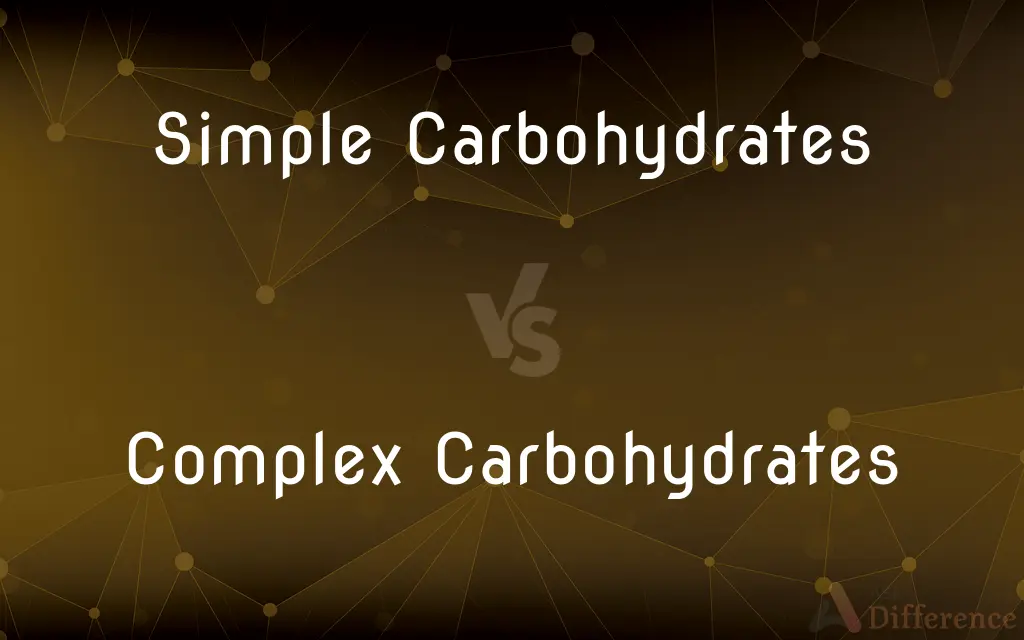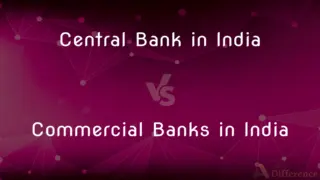Simple Carbohydrates vs. Complex Carbohydrates — What's the Difference?
By Tayyaba Rehman — Published on December 24, 2023
Simple carbohydrates are quickly digested sugars, while complex carbohydrates are longer chains, digested slowly.

Difference Between Simple Carbohydrates and Complex Carbohydrates
Table of Contents
ADVERTISEMENT
Key Differences
Simple carbohydrates and complex carbohydrates are both vital energy sources for the body, yet they differ considerably in structure and the way our bodies metabolize them. The distinctions play a role in health and dietary considerations.
Simple carbohydrates are basic sugars, usually with one or two sugar molecules. Due to this simplicity, they're quickly broken down and absorbed by the body, providing a rapid energy source. Conversely, complex carbohydrates consist of longer chains of sugar molecules, necessitating a more prolonged digestive process.
The foods containing simple carbohydrates often lead to a swift increase in blood sugar levels, whereas those rich in complex carbohydrates usually provide a steadier energy release. Consequently, frequent consumption of foods high in simple carbohydrates can cause blood sugar spikes, while complex carbohydrates help maintain stable blood sugar levels.
In terms of nutritional sources, simple carbohydrates are commonly found in fruits, milk, and foods with refined sugars like candies and soda. In contrast, complex carbohydrates are abundant in foods like whole grains, legumes, and vegetables.
When planning a balanced diet, understanding the distinction is crucial. While both simple carbohydrates and complex carbohydrates have a place in nutrition, it's generally advised to consume more of the latter due to the extended energy release and additional nutrients they provide.
ADVERTISEMENT
Comparison Chart
Molecular Structure
One or two sugar molecules
Longer chains of sugar molecules
Digestion Rate
Rapid
Slow, prolonged
Impact on Blood Sugar
Swift increase
Steady, gradual increase
Common Sources
Fruits, milk, candies, soda
Whole grains, legumes, vegetables
Nutritional Value
Often less nutritious, can lead to sugar spikes
More nutritious, steady energy
Compare with Definitions
Simple Carbohydrates
Found in refined foods and natural sugars.
Desserts are typically loaded with simple carbohydrates.
Complex Carbohydrates
Help in maintaining stable blood sugar.
Consuming brown rice helps avoid sudden blood sugar spikes due to its complex carbohydrates.
Simple Carbohydrates
Leads to swift blood sugar spikes.
Consuming too many pastries can spike blood sugar, thanks to simple carbohydrates.
Complex Carbohydrates
Present in whole grains and legumes.
Beans and lentils are rich in complex carbohydrates.
Simple Carbohydrates
Basic sugars with quick digestion.
The sugar in candy bars is a prime example of simple carbohydrates.
Complex Carbohydrates
Require prolonged digestion.
Foods like whole grain bread, rich in complex carbohydrates, keep you full longer.
Simple Carbohydrates
Provide rapid energy boost.
Drinking sodas gives a quick energy rush due to simple carbohydrates.
Complex Carbohydrates
Comprised of longer chains of sugar molecules.
Starch in potatoes is a type of complex carbohydrates.
Simple Carbohydrates
Usually one or two sugar molecules.
Fructose in fruits represents simple carbohydrates.
Complex Carbohydrates
Slow, steady energy release.
Eating oatmeal for breakfast provides sustained energy from complex carbohydrates.
Common Curiosities
What are Simple Carbohydrates?
They are basic sugars with one or two sugar molecules, digested quickly.
Are fruits a source of Simple or Complex Carbohydrates?
Fruits primarily contain Simple Carbohydrates.
How are Complex Carbohydrates different?
Complex Carbohydrates consist of longer chains of sugar molecules, digested slowly.
Which carbohydrate type leads to swift blood sugar spikes?
Simple Carbohydrates can cause rapid blood sugar spikes.
Are all Simple Carbohydrates unhealthy?
Not necessarily. Naturally occurring ones, like in fruits, are nutritious but should be balanced with Complex Carbohydrates.
How do the two impact digestion?
Simple Carbohydrates digest quickly, while Complex Carbohydrates digest more slowly.
Why are Complex Carbohydrates considered healthier?
They provide steady energy, maintain blood sugar levels, and are often more nutritious.
Can a diet have both carbohydrate types?
Yes, but it's recommended to prioritize Complex Carbohydrates for balanced nutrition.
Where can you typically find Complex Carbohydrates?
In whole grains, legumes, and certain vegetables.
Which is better for long-term energy?
Complex Carbohydrates due to their slow, steady energy release.
What are some sources of Simple Carbohydrates to avoid?
Foods with refined sugars like candies, sodas, and many processed foods.
Which gives rapid energy?
Simple Carbohydrates provide a quick energy boost.
Do Complex Carbohydrates aid in feeling full?
Yes, their prolonged digestion can help in feeling satiated for longer.
What happens when consuming excessive Simple Carbohydrates?
It can lead to weight gain, blood sugar spikes, and other health issues.
Are all Complex Carbohydrates high in fiber?
Many are, like whole grains and legumes, but not all. Always check nutritional info.
Share Your Discovery

Previous Comparison
Central Bank in India vs. Commercial Banks in India
Next Comparison
Oberoi Hotels vs. Taj HotelsAuthor Spotlight
Written by
Tayyaba RehmanTayyaba Rehman is a distinguished writer, currently serving as a primary contributor to askdifference.com. As a researcher in semantics and etymology, Tayyaba's passion for the complexity of languages and their distinctions has found a perfect home on the platform. Tayyaba delves into the intricacies of language, distinguishing between commonly confused words and phrases, thereby providing clarity for readers worldwide.












































